Believe in yourself, and say “I can do this”
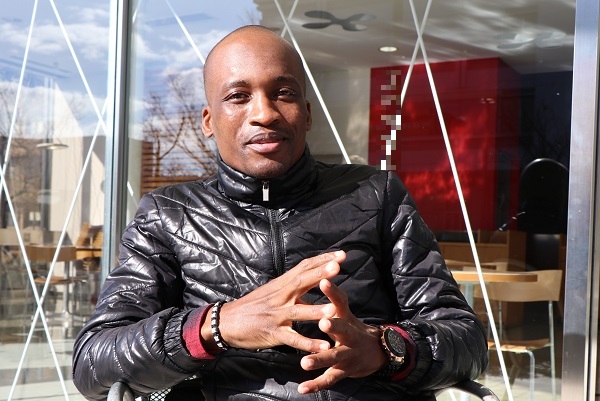
Name: Chomunorwira Tafara
Home Country: Zimbabwe
Affiliation: 1st year PhD Student in the Graduate School of Humanities and Social Sciences (Mathematics Education Major)
Hobbies: Playing chess and playing guitar
(Interview Date: January 6, 2022)
Please describe your hometown.
I’m from Zimbabwe; it is made up of 10 provinces, which are like prefectures in Japan. I come from one of the provinces called Mashonaland central and my hometown is the capital city of that province, it’s called Bindura. It survives thanks to mining and agricultural activities. Actually, it is a hub of mining, where we get gold, chrome, and nickel. When it comes to farming, we grow vegetables like tomatoes and leafy vegetables. Basically, I can describe it as a hub of economic activity in Zimbabwe.
Why did you decide to come to Japan, and why Hiroshima University?
Actually, there are two main reasons as to why I chose to come to Japan. The first is, I really needed funding for my PhD. I applied for scholarships in both America and Japan, but I was accepted by one in Japan. The other reason is that my Master’s thesis supervisor was always using Japan as a point of reference. He is the one who introduced me to this area of project-based learning. During each meeting he would say “for example in Japan, they do this…”, “for example in Japan, they do that…” From that I developed the curiosity and eagerness to want to see for myself, and I thought “If I go to Japan, I think I’m going to learn a lot.” So those are the two main reasons as to why I chose to come to Japan.
About why I chose HU; in my country, each time people hear about Japan, there are 3 places they think of. Tokyo, because it’s the capital. And also, Hiroshima and Nagasaki because of the historical bombings. When I obtained a list of universities in Japan, I was attracted by Hiroshima, and I thought “I want to go there so I can see for myself what happened during the atomic bombing.” That is the main reason I chose HU.
Tell us your first impression of HU.
I really loved the university. Because when we arrived at Hiroshima Airport, the hospitality that was given to us by our professors was really out of this world, out of my definition. In Zimbabwe, it is really difficult for professors to welcome students like that. In this case, I arrived at the airport, they gave us a warm welcome, and before they took us to our hostels, they showed us some places. I was really impressed by everything.
What were you doing before entering HU?
I was teaching mathematics in both junior high and senior high school levels at one of the schools in Harare, the capital city of Zimbabwe. I’ve been teaching since 2010, and I am also an examiner; I used to mark national examinations. So, that was my job to say, teaching and assessing students.
Wasn’t it a very difficult decision for you to leave the school to study abroad?
I can’t say it was very difficult, but I can’t say it was easy. Leaving the job wasn’t an issue, because they gave me study leave. The main problem was to leave my family behind, because I am married, and I have two sons. Even now, sometimes when I think of my family I feel like crying, but that’s what life is all about. Sometimes you need to make sacrifices to achieve something.
So, you came to HU one year ago, and attended the Intensive Japanese Training Course before entering the graduate school. How were the classes?
I enjoyed studying Japanese because the way Japanese sounds is similar to my original language. Like in Japanese when you say toire (toilet), in our language it sounds very similar. So, in most cases it was interesting to hear the sound of my language.
Also, in Japanese when you say hai, it means yes. And when you say iie, it means no. But in my country, it is the other way around. If you say hai it means you are saying no. So, each time my teacher asked me a question I would take time to think, “I want to say yes, so what should I say?”
Although I loved studying Japanese, the problem was that I was the only student in that class. The teachers would give me some homework every class, but I had no one to ask or compare with, so there was a lot of pressure on me. So far, I have only learned a little Japanese, enough for me to move around. I can go anywhere alone and communicate, which is the good part of it.
And now you are majoring in Mathematics Education at Doctoral level. What kind of research are you most interested in lately?
I am now interested in inquiry-based research as well as studying humanity, ethics and moral education in relation to scientific discoveries.
It sounds a little difficult to us. Could you be more specific?
About inquiry-based research, I always try to make teaching mathematics real, to bring it to reality. So, there is an approach called “project-based learning” in which we are designing projects based on real life scenarios, where students apply their mathematical knowledge to solve a problem within their society, which could be a real problem or a designed problem. What I intend to do is bring that abstractness of mathematics into reality. The best way of learning is to learn by doing. So that is what the approach is all about. When you learn by doing, you internalize everything.
Regarding humanity and ethics education, when I visited the atomic bomb site and saw the list of names of those who perished, and the structure which remains standing after the bombing, I asked myself, “if science can take us this far, it’s no longer good for us. So, what should we do?”
Of course, there is no one here who is studying weapons, but it’s not all about weapons. If those who are studying biology and other science-related subjects are not ethical enough and they do not respect humanity, they can still cause harm to people. Scientific discoveries must be used for and not against humankind. Not only would these kinds of measures be beneficial for Japan, but also for the world at large.
Thank you for explaining in detail. By the way, are there any big differences between university life in your country and in Japan?
Yeah, a great difference. One of the differences is that in Japan, Master’s and PhD students have their own place, which is called a lab. That is their own space that nobody else can use. In Zimbabwe, it’s not like that. You only have lecture rooms which are for everyone, and offices are for professors and other staff. Here, I was surprised to see that almost all Master’s and PhD students have their own permanent table, or their own lab to study in.
Also, it is so quiet here. During lunch time, it is very rare to find people talking, laughing and making some noise. In my country there would be a lot of noise and laughing during those times. That is also another big difference between university life in Japan and Zimbabwe.
Have you visited Japanese schools as part of your research?
Yes, I went last year, in November. I went to the Hiroshima University attached high school, to see how they teach their students some particular topics. I was just observing but I learned a lot related to my research. Right now, I am scheduled to go back to the same school, this coming February. This time they want me to talk to the students about how we learn mathematics in Zimbabwe, so I will be presenting to the students.
What kind of tools do you usually use for your lessons?
Besides electronics, like projectors and stuff, we have mathematical instruments, compasses, protractors, etc. We call it media. It’s actually a must to bring the media whenever you are teaching. The philosophy in my country is that learners will only understand when you use some media. You can’t just say “when you measure 10 meters,” they want to see you measuring 10 meters. So, every lesson you have to bring something related to your topic, to make sure the students are understanding what you are saying.
How is the school system in Zimbabwe?
Our school system, during my days, was 7-4-2, 7 years doing primary education, which is what you call elementary education in Japan, then 4 years for junior high school, then 2 years for high school, and then after that you go to university. But now elementary education has been increased to 9 years, so it is 9-4-2.
As for entrance exams, at primary school level, every student takes an exam before they get into junior high school. But of course, even if they fail they will go to junior high school. But from junior high school, if you fail you cannot proceed to high school, making it the most important exam. Then from high school you also need to pass an exam to get into university.
Is it tough?
Yeah, definitely. It’s tough. Especially the ones when you want to proceed to A-Level (we call senior high school A-Level), and the one to get into university, those exams are really hard.
Almost everyone will have primary education, probably 95% - 98% will go to junior high, then as you proceed to high school it decreases to about 50%. A lot of people will not be able to go to high school. From high school to university it decreases again to about 20%. So, you can see how the percentage drops, which shows there are still some difficulties when it comes to exams.
As a teaching professional, what do you think of special classes only for “gifted children”?
There are two sides of the coin. I will start with the positives. You need to make sure you have the best brains of the country and channel them towards what you want to achieve. On the other hand, learning is not just about academics, but also about socializing. Those other learners, whom we may perceive to be slow learners, have something that those who are considered as sharp learners may not have. If they learn together, socialize and share ideas, it might be to the betterment of the sharp learners. So actually, it is important to have mixed ability classes. That’s my opinion.
How about special lessons for students who are struggling?
I think it is good. Because sometimes those students might not learn at the teacher’s pace. So, each time you do something at your own pace, without rushing, you end up understanding, or improving on your understanding. We call them extra lessons, to say they are lessons outside of the normal allocated time. They are very important because they give you time to reflect, to learn more about the topic. So, I don’t see anything bad about it, it’s a very good thing.
Do you have any advice for students who are struggling to understand mathematics?
One thing I always advise people, whether they are Japanese or Zimbabwean, is if you want to be a good mathematics student, the first step is to believe in yourself, to say “I can do this.” Even if you find a good teacher, and don’t believe in yourself, you will not understand. The other is to develop an interest in the subject, no matter how many times you fail. The biggest challenge for most students is that they don’t have an interest in the subject. So, the moment you lose interest and that you don’t practice mathematics, you’re doomed.
In most cases, students who are inclined to literature, humanities, etc. don’t like mathematics. And those who are inclined to sciences think they like mathematics. You will find in my country that those students who are very good in mathematics are not good in languages like English. So, it is just a matter of your perception. People tell themselves “I am a humanities person, I am not a science person”. Before you do anything, the first thing to do is to demystify that idea, and tell yourself “I love mathematics,” only then should you start practicing it. That’s my advice.
Would you like to share some advice for students who are thinking about studying abroad in the future?
Yeah, for anyone coming to Japan, I would like to say that Japan is a good place to study and you will really learn a lot. But, one important thing to do before you come to Japan is to research life in Japan.
An example from my experience: in Zimbabwe, the equivalent to 1,000 yen is enough to buy food for 5 days, without any difficulties. When I came to Japan, I didn’t fully realize how expensive things are. I was so shocked to see that with my 1,000 yen I could buy enough for only one day. My advice is that before you come to Japan, research everything about daily life in Japan. But generally speaking, university life in Japan is so wonderful.
Last question. Tell us your dream for the future.
Academically, I intend to contribute, if not to come up with a mathematics teaching model that is internationally recognized. That’s why my studies are all about ways of teaching – teaching methodologies. So far, I’m still brain storming a new method, which I can call the 21st century model of teaching mathematics. If I find all the support I need, then I wish to come up with a model that can be accepted internationally.
Professionally, I think I would like to become a mathematics curriculum designer, or a university professor, teaching mathematics and maybe other courses to do with mathematics education. So that’s what I intend to do after finishing my studies.
Photo Gallery
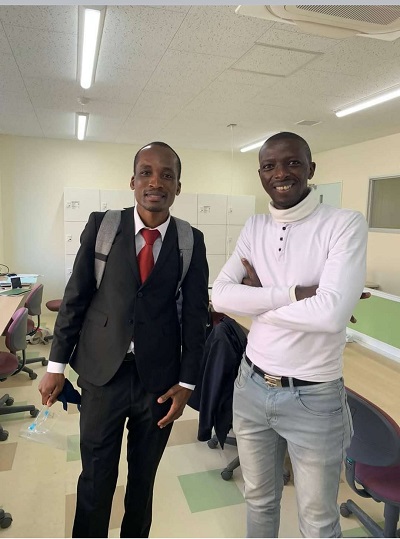
With my Kenyan friend (Enoc) after taking my PhD entrance exam

With my fellow Zimbabweans (Sheila and Nyasha)
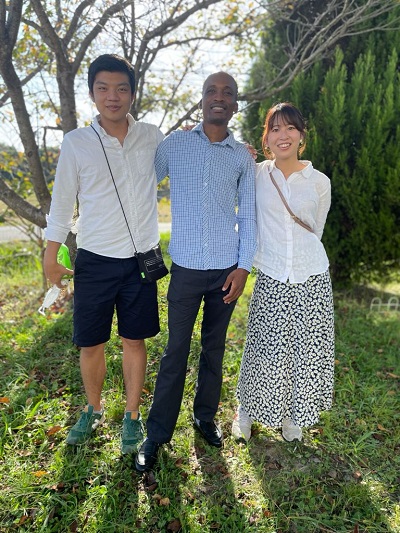
Myself, Kanade and Takashi at Church
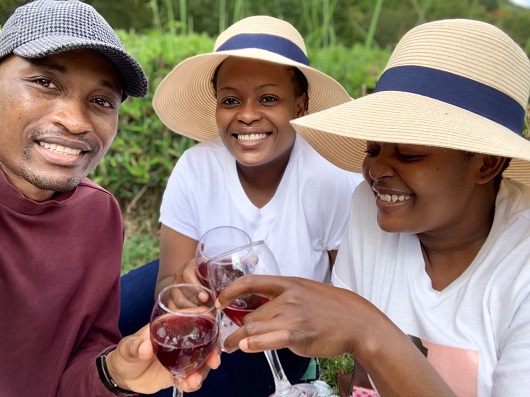
Myself with fellow Zimbabweans (Sheila and Nyasha) in Kagamiyama Park
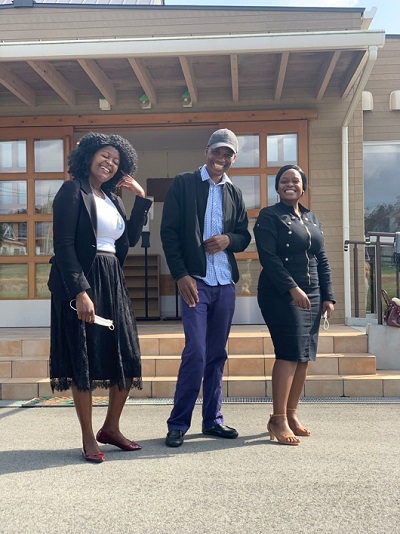
Myself, Nyasha and Sheila at Church
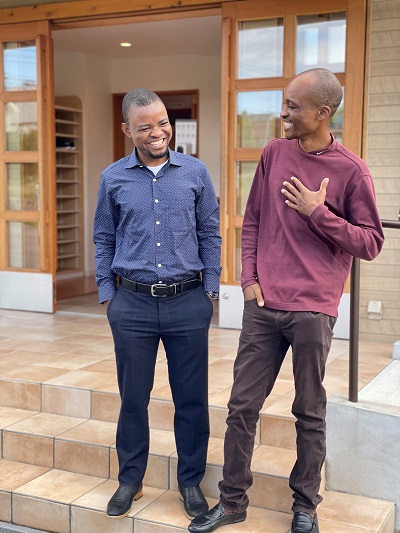
With my friend from Malawi, Lloyd
Upon thorough implementation of infection prevention measures, masks are sometimes removed during interviews for the purpose of taking photographs.


 Home
Home